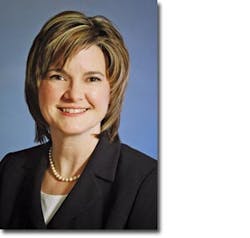South West Transit Association's Kristen Joyner
If my crystal ball were not at the cleaners, I could make a lot of predictions regarding the future of transit in America. Since I don’t have access to fortune telling devices, let’s start with the answer to one of the first questions posed when I began with South West Transit Association. “Whatever happened to the ‘Mass’ in ‘Mass Transit”? SAFETEA-LU formalized the evolution of mass transit into public transportation. This concept is our future.
Today’s public transportation is not just about moving masses of people from point A to point B, the focus of yesteryear’s mass transit. Public transportation is part of our country’s foundation to be defensively safe, economically sound, environmentally responsible and ethically accountable to human service needs. To be successful, we must approach public transportation as a comprehensive package, integrated seamlessly with the needs of this and future generations.
The common defense of our nation depends on high-quality roads and effective transportation of equipment, medical personnel, volunteers and victims of tragedy. A healthy investment in new rail projects and proactive bus and van replacement is crucial for this constitutional goal.
People should have access to workplace and educational opportunities, goods and services need to be transported to destinations of need, and barriers removed so consumers can spend their money. Without a solid public transportation system, we fail the future economy of our communities. Investment, urban planning, public/private partnerships and pro-transit determined leaders will keep our communities moving forward.
We are living in the new golden age of public transportation from an environmental messaging standpoint. There’s nothing quite like a new, shiny bus that is running on electricity, natural gas or even water to demonstrate the role mass transit plays in protecting our natural resources. Innovation is the reason America has not just survived, but thrived. Public transportation is fostering innovations in using new energy resources and creating livable communities that allow Americans to take an active stand for our environment.
Our population is living longer. We have many challenges as Baby Boomers age, stop driving and need increased health care. Transportation networks between communities, states and across FTA regions that allow us to transport people to receive the care they need will make our industry more effective. The future of public transportation includes taking care of the transportation needs of the most vulnerable in our society.
Three actions will secure our strength and health. First, securing funding that is at least twice the current level. Our industry’s federal funding has historically come through the Department of Transportation. Is it time to draw on sources of funding from Defense, Energy, and Health and Human Resources and create new ways to distribute the money that enables communities to take care of their unique transportation needs?
Second, we must effectively communicate the value of transit to the public. Support for public transportation means economic growth. We need a national, unified message that clearly defines our value.
Finally, we must provide a well-educated, qualified and motivated workforce to deliver these public services. SWTA is committed to the development of educational programs that encourage young people to enter our industry and stay. The average age of our transit leadership is 53 — now is the time to plan for our industry’s future.
Our incoming national leadership has communicated a desire to grow public transportation; the public is rediscovering the need for good public transportation as a result of the current gas and economic crises; and our industry leaders are preparing for changes that, if funded properly, will leave a great legacy.
So, what happened to the “mass” in “mass transit”? It grew up and became public transportation, and the future looks hopeful!
Biography
Kristen Joyner is the executive director of SWTA. She brings energy, creativity and a diverse background that includes administrative public transportation work for Central Arkansas Transit Authority, board training and non-profit development for Circle Communications and national corporate development training for Fred Pryor/Career Track Seminars. Joyner was hired by the SWTA board on April Fools Day, 2007 and despite this fact, all believe it was a wise and wonderful decision!
